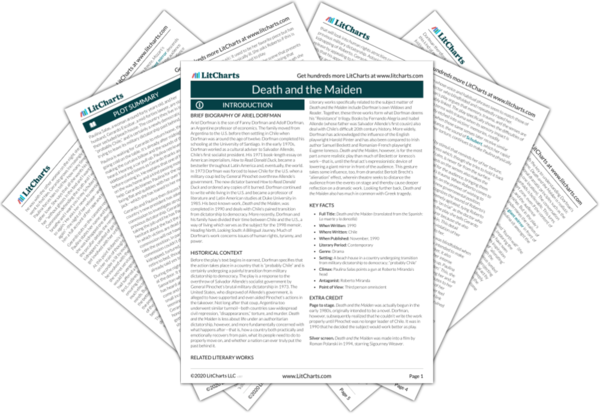Classical composer Franz Schubert is mentioned throughout the play. In particular, his quartet “Death and the Maiden” crop up frequently. In general terms, classical music is supposed to be evidence of mankind’s refinement and elevation above the cruelty of the animal kingdom. It conjures thoughts of education, skill and sensitivity. This, of course, is markedly contrasted with the horrific violence described in the play. Furthermore, the way in which Paulina’s rapist would play this string quartet during the attacks represents a gruesome depravity, in which something that is supposed to bring sensory enjoyment becomes a marker of extreme terror. That’s why, since her rape, Schubert’s music has made Paulina physically ill—even though he was once her favorite composer. Paulina plays Schubert once she has Roberto tied up, in an attempt to reclaim his music—and, accordingly, a part of herself—from her attacker.
The actual content of the quartet itself also carries specific symbolism. “Death and the Maiden” is recurring motif in Renaissance art, usually depicting a young woman being seized by a personification of death (this can also be traced back to medieval images of the “dance of death”). These images have a subtext of eroticism, and the presence of Schubert’s quartet thus gestures to the macabre intimacy of Paulina’s rape. Her doctor, then, represents a kind of death figure—though he has not killed her, he has certainly killed a part of her character.
Schubert’s “Death and the Maiden” Quotes in Death and the Maiden
PAULINA: D’you know how long it’s been since I last listened to this quartet? If it’s on the radio, I turn it off, I even try not to go out much, though Gerardo has all these social events he’s got to attend and if they ever name him minister we’re going to live running around shaking hands and smiling at perfect strangers, but I always pray they won’t put on Schubert. One night we were dining with— they were extremely important people, and our hostess happened to put Schubert on, a piano sonata, and I thought, do I switch it off or do I leave, but my body decided for me, I felt extremely ill right then and there and Gerardo had to take me home, so we left them there listening to Schubert and nobody knew what had made me ill, so I pray they won’t play that anywhere I go, any Schubert at all, strange isn’t it, when he used to be, and I would say, yes I really would say, he’s still my favorite composer, such a sad, noble sense of life. But I always promised myself a time would come to recover him, bring him back from the grave so to speak, and just sitting here listening to him with you I know that I was right, that I’m—so many things that are going to change from now on, right? To think I was on the verge of throwing my whole Schubert collection out, crazy!
(raising her voice, to Gerardo)
Isn’t this quartet marvellous, my love?
[…]
The real real truth is that you look slightly bored.

Unlock explanations and citation info for this and every other Death and the Maiden quote.
Plus so much more...
Get LitCharts A+









